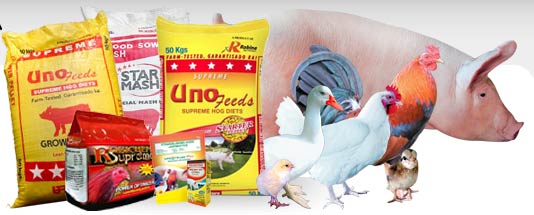URC-AIG grows hand-in-hand with farmers through its Kabalikat Farm Program
By: Susan Cristina Agustin
|
Published on: December 18, 2018

Zaldy Angcaya of Amadeo, Cavite is a long-time Uno+ Hog Feeds and Veterinary Products distributor and among the first farmers to join the Kabalikat Farm Program of Universal Robina Corporation – Agro Industrial Group (URC-AIG).
“Since I started my piggery, I have always used Uno+ Hog Feeds. Then the distributor made me a dealer. After about two years, I also became a distributor. When I rst joined, I did not know what Kabalikat was, but I was told it could help us,” Angcaya said.
The Kabalikat program that Angcaya joined is a URC- AIG initiative that allows farmers to become Robina Agri Partners. As Agri Partners/Kabalikat, they are integrated into the URC-AIG value chain as distributors and consumers. They also receive training and technical services.
In Angcaya’s case, he started as a consumer before becoming a distributor of URC products.
Sonny Humarang, who has been a hog farmer for 15 years and a Kabalikat member for ve, said before the Kabalikat Farm Program, it took four to five months before he could sell his pigs.
After attending Kabalikat seminars, the farmer, who confessed he liked to try new things, said he learned the proper way to feed his pigs, how to clean the pens and what medications pigs needed. The lessons significantly improved the productivity of his farm, he said.
Humarang said he could now sell his pigs after just two months. He reduced his spending on facilities, since being able to sell his pigs after just two months meant he did not need as much space as before.
Like Angcaya, Humarang said that with Kabalikat’s help, he was able to expand his farm. Having passion for what you do and a willingness to keep learning helped, he said.
Angcaya said young people should know that there is money in agriculture but they have to be smart. Kabalikat Farm Program, he said, taught him that carrying too much utang (debt) was not wise.
From personal experience and by observing others, he said one did not need a lot of money to be financially successful in the piggery business. He pointed out that he started with a small piggery but because he was invested in the venture and kept seeking new knowledge to improve his farm, it grew and became sustainable. Others, he said, started with a much bigger piggery than his and put in a larger investment, but they failed because they lacked the knowledge or were not as committed.
URC-AIG’s involvement in the agricultural industry uplifts the lives of many farmers
He said those planning to go into the business would find that there was money in it and they could succeed. Help was available.
“Technology is available to help farmers keep their piggery clean and not as smelly as feared. We learned through the Kabalikat Farm Program how to control odor and clean pens properly. It is important to find the right location and to continue learning. Piggery and agro-industry, in general, are important as the Philippine population grows and the demand for food increases,” Angcaya said.
Eric Malinis, a Kabalikat farm technician, is among those who have proven helpful to Angcaya and Humarang. Malinis said being a technician had given him a purpose.
A graduate of Animal Science and Production from Laguna State Polytechnic University, Malinis served as a technician in other farms before going into farming and hog-raising himself, eventually becoming a K-Tech (Kabalikat technician). He is now serving six farms in Rizal, Laguna and Cavite.
“WE CONDUCT SEMINARS – ONE OF THE GOOD ASPECTS OF THE JOB. I AM ABLE TO SHARE WHAT I KNOW WITH THOSE WHO NEED MORE INFORMATION, LIKE SMALL BREEDERS OR THOSE WHO WANT TO GO INTO THE BUSINESS.”
As a Kabalikat technician, he said he was able to share his knowledge and help farmers expand their businesses.
“We conduct seminars – one of the good aspects of the job. I am able to share what I know with those who need more information, like small breeders or those who want to go into the business. I tell them about (URC) products, technical things, hog diseases and management. It is very important for a technician to talk to them even about simple problems like starting a piggery,” Malinis said.
With the help of experts like Malinis, URC-AIG’s involvement in the agricultural industry has improved many lives.
Robina Farms and Robichem have been working closely with farmers since the 1960s, providing quality products and services.
Before the term inclusive business became popular, URC had already begun integrating Filipino farmers into its value chains. Before they launch their feeds or veterinary products to the market, they of course use them in their very own farms – solidifying their claims that their products are farm-tested. This is why many customers become very loyal consumers and distributors of the products. Several farmers even claim that URC-AIG treats them more like partners and not as mere customers, as evidenced by Angcaya and Humarang’s testimonies.
The story of the Philippines’ first multinational company is a testament to how a company can grow by treating its clients right and empowering them to develop their smaller businesses.
URC-AIG has indeed proven over the decades that the best way to empower Filipino farmers is not through handouts but by working with them, hand-in-hand.
This story is part of a series of articles written by GO NEGOSYO writers being published by GoodNewsPilipinas.com every Tuesday as part of our support to Philippine businesses.